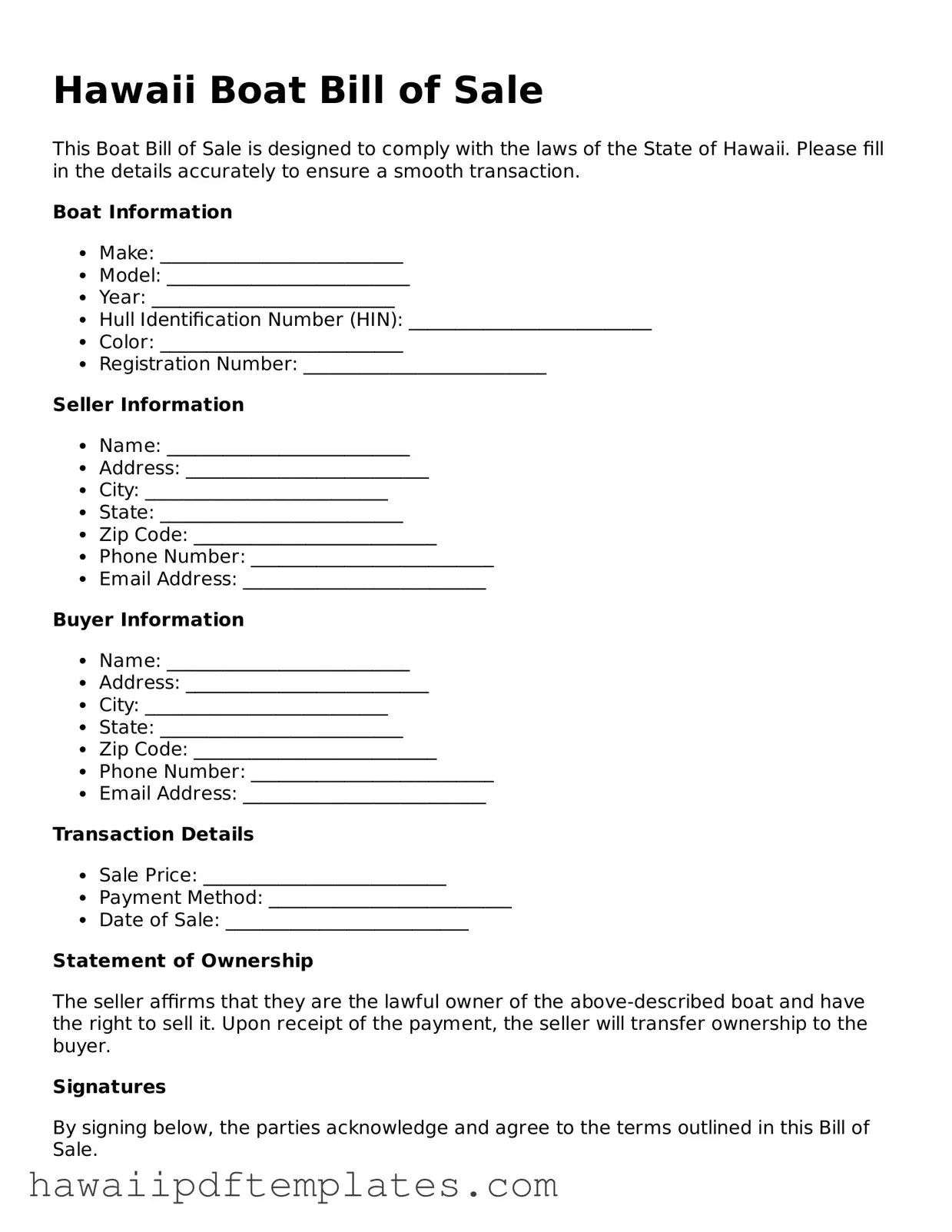Free Boat Bill of Sale Document for Hawaii State
Frequently Asked Questions
-
What is a Hawaii Boat Bill of Sale?
A Hawaii Boat Bill of Sale is a legal document that records the transfer of ownership of a boat from one party to another. It serves as proof that the seller has sold the boat and that the buyer has purchased it. This document is important for both parties, as it helps avoid disputes in the future.
-
Why do I need a Boat Bill of Sale?
You need a Boat Bill of Sale to officially document the sale of a boat. This form is often required by the state of Hawaii for registration purposes. It protects both the seller and the buyer by providing a clear record of the transaction, including details about the boat and the parties involved.
-
What information is included in the form?
The Boat Bill of Sale typically includes:
- The names and addresses of the buyer and seller
- The description of the boat, including the make, model, year, and identification number
- The sale price
- The date of the sale
- Signatures of both the buyer and seller
-
Do I need to have the form notarized?
In Hawaii, notarization is not usually required for a Boat Bill of Sale. However, having it notarized can provide an extra layer of security and validation for the transaction. It may also be helpful if you plan to register the boat or if any disputes arise later.
-
Can I use a generic Boat Bill of Sale form?
While you can use a generic Boat Bill of Sale form, it is recommended to use a form specifically designed for Hawaii. This ensures that all required information is included and complies with state regulations. Using the correct form can help streamline the registration process.
-
What should I do after completing the form?
After completing the Boat Bill of Sale, both the buyer and seller should keep a copy for their records. The buyer should then take the signed document to the appropriate state agency to register the boat. This step is crucial to ensure that the boat is legally registered in the new owner's name.
-
What if there are issues after the sale?
If issues arise after the sale, the Boat Bill of Sale can serve as an important piece of evidence. It outlines the terms of the sale and can help clarify what was agreed upon. If disputes cannot be resolved between the parties, it may be necessary to seek legal advice.
Other Common Hawaii Forms
Hawaii Bill of Sale for Trailers - This document may also contain clause options for the buyer to inspect the trailer pre-sale.
A California Non-disclosure Agreement (NDA) is a legal contract designed to protect sensitive information shared between parties. This agreement ensures that confidential information remains private and is not disclosed to unauthorized individuals. By signing an NDA, parties can foster trust and facilitate open communication while safeguarding their proprietary information, which can be initiated by completing the Non-disclosure Agreement form.
Hawaii Homeschool Laws - An affirmation of commitment to home-based education for children.
Steps to Writing Hawaii Boat Bill of Sale
After gathering the necessary information, you can proceed to fill out the Hawaii Boat Bill of Sale form. This document is essential for transferring ownership of a boat. Ensure that all details are accurate to avoid any issues during the registration process.
- Begin by entering the date of the sale at the top of the form.
- Provide the names and addresses of both the seller and the buyer. Make sure to include full names and current addresses.
- Fill in the boat's details, including the make, model, year, and hull identification number (HIN).
- Indicate the sale price of the boat clearly.
- Include any additional terms of the sale, if applicable. This can include items like warranties or conditions of sale.
- Both the seller and buyer should sign and date the form at the bottom. Signatures must be handwritten.
- Make copies of the completed form for both parties' records.
Misconceptions
The Hawaii Boat Bill of Sale form is often misunderstood. Here are six common misconceptions about it:
- It is not legally required. Many people believe a bill of sale is optional. However, having a bill of sale is essential for documenting the transfer of ownership.
- It only applies to large boats. Some think the form is only necessary for yachts or large vessels. In reality, it applies to all types of boats, regardless of size.
- It can be a verbal agreement. Some individuals assume a verbal agreement suffices. A written bill of sale provides legal proof of the transaction and protects both parties.
- It is only for buyers. Many believe only the buyer needs a bill of sale. In fact, both the buyer and seller benefit from having a signed document.
- It is a complicated process. Some people think filling out the form is difficult. The truth is, it is straightforward and can be completed quickly with the right information.
- It does not need to be notarized. There is a misconception that notarization is unnecessary. While it is not always required, having the document notarized can add an extra layer of security.
